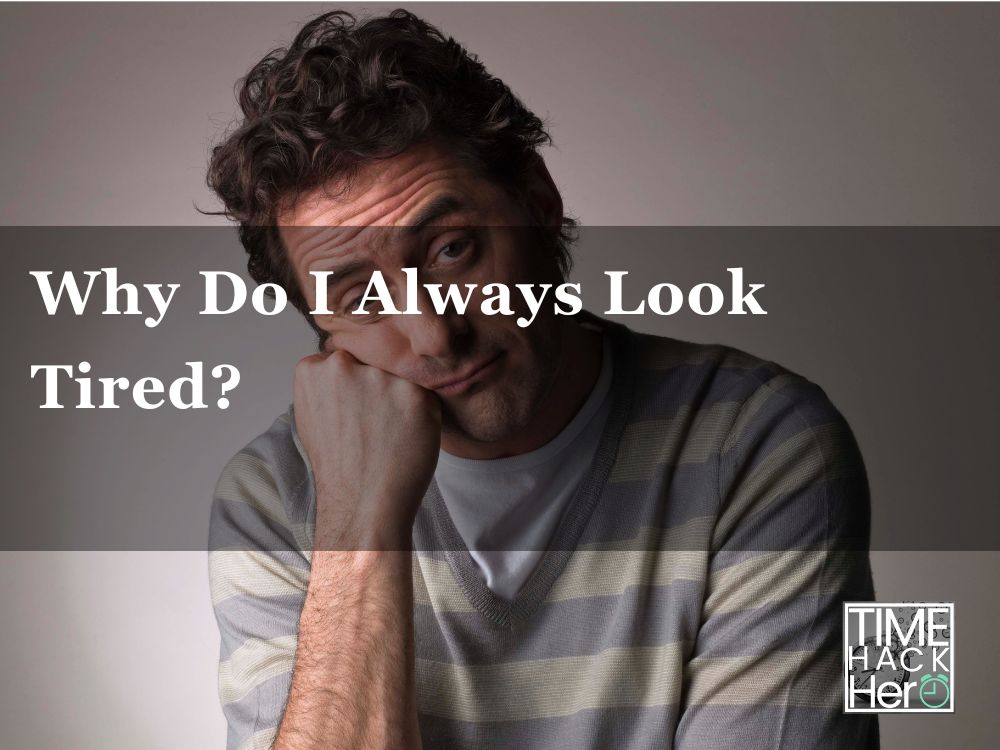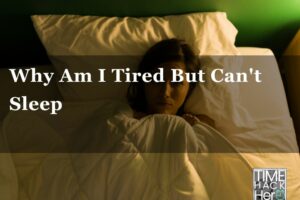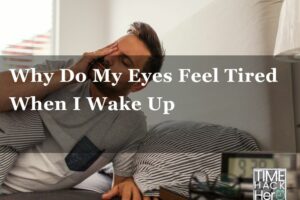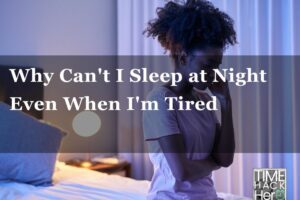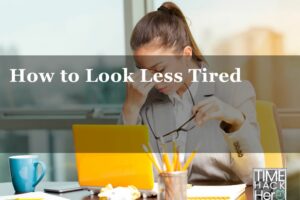Feeling tired or looking exhausted, even after a full night’s rest, is an issue that afflicts many people. Constant fatigue and dark undereye circles can damage self-esteem and cause others to make unfair assumptions about your health or lifestyle.
Table of Contents
Is this normal?
Looking a bit worn out occasionally is common, especially during stressful times. But appearing continually drained or sleep deprived is a sign that something more serious may be going on.
There are various reasons why someone might have persistent tiredness or a fatigued appearance. Understanding the potential causes can help you pinpoint solutions to revitalize your look and energy levels.
Reasons Why You May Look Tired
There are various lifestyle, health, and genetic factors that can contribute to an exhausted appearance:
1. Sleep Deprivation
Not getting enough quality sleep is an obvious reason you may look worn out.
The recommended amount of sleep for most adults is 7-9 hours per night. If you regularly get fewer than 6 hours, chronic sleep deprivation can lead to dark under-eye bags, pale skin, and a generally tired look.
2. Poor Sleep Quality
You might be in bed for 7-8 hours but still not get truly restorative sleep. Poor sleep quality prevents the body from fully recharging.
Causes of poor sleep quality include:
- Insomnia
- Sleep apnea
- Restless leg syndrome
- Chronic pain or discomfort
- Stress and anxiety
- Environmental noise
- Light pollution
- Hot sleeping environment
- Uncomfortable mattress or bedding
Tossing and turning all night leads to tired-looking eyes and fatigue even after your normal sleep hours.
3. Dehydration
Lack of fluids causes blood volume to drop, forcing circulation to slow. This reduces oxygen and nutrients reaching the skin.
Dehydration can give your complexion a dull, tired appearance. Drinking adequate water is essential for healthy looking skin.
4. Vitamin Deficiencies
Deficiencies in certain vitamins show in the skin, contributing to constant fatigue.
Key vitamins tied to tiredness include:
- Vitamin D – Lack of vitamin D hampers collagen production and skin turnover. Skin appears sallow and lifeless.
- Iron – Iron carries oxygen through the blood to organs and tissues. Low iron reduces oxygen, making you look drained.
- Vitamins B2 and B3 – Riboflavin (B2) and niacin (B3) help body cells convert food to energy. Deficiency causes fatigue.
- Vitamin A – This vitamin repairs and regenerates skin cells. Without it, skin looks dull and wrinkled.
- Vitamin C – Vitamin C aids collagen production. Lack of C causes lifeless, tired skin.
Load up on foods rich in these vitamins or take supplements to correct shortfalls.
5. Anemia
Anemia occurs when you lack enough healthy red blood cells to carry oxygen to tissues. The most common cause is iron deficiency.
Anemia symptoms like weakness, fatigue, and pale skin can make you appear constantly tired. See your doctor for a simple blood test to check for anemia.
6. Thyroid Disorders
The thyroid gland controls your body’s energy production. Both hyperthyroidism and hypothyroidism can make you look tired.
Hyperthyroidism speeds up metabolism, which can make eyes look bulgy and staring.
Hypothyroidism causes overall sluggishness and fatigued appearance.
Get your thyroid levels tested if tiredness persists.
7. Chronic Stress
When you’re stressed, the body produces cortisol and other hormones that trigger inflammation. Inflammation aggravates dark under-eye circles and haggard appearance.
Daily stress management helps reduce tired appearance caused by stress hormones.
8. Allergies
Seasonal allergies provoke immune responses that cause fluid buildup and swelling around the eyes. This exacerbates dark, sunken eye bags.
Year-round allergies to dust mites or pet dander can cause the same puffy, tired look. Try over-the-counter antihistamines to reduce allergic reactions.
9. Eyestrain
Working long hours focusing on backlit screens can cause tired, sore eyes. Eyestrain makes eyes red, dry and fatigued looking.
Follow the 20-20-20 rule to reduce eyestrain: Every 20 minutes, look away about 20 feet in front of you for 20 seconds.
10. Smoking
Cigarette smoking restricts blood vessels, impairing blood circulation. Smoking also strips oxygen from blood, starving skin cells.
The resulting nutrient deprivation and oxygen lack make skin appear dull and lifeless. Quit smoking to perk up your appearance.
11. Genetics
Some people naturally have darker pigmentation and thinner skin around the eyes. This gives the appearance of constant shadows and tiredness.
Using a color corrector and concealer can help mask genetic dark circles, as can chemical peels or laser treatments. But results are temporary.
12. Aging
As we get older, skin loses collagen and elasticity. Fat pads under the eyes may sink and hollow. This casts shadows making you look weary.
Cosmetic procedures like lower eyelid surgery can treat sunken eyes. But results don’t last. Using an eye cream with hyaluronic acid helps plump skin.
Ways to Fix Looking Constantly Tired
If you appear fatigued most of the time, use these methods to uncover why and make positive changes:
Track sleep patterns
- Note what time you go to bed, fall asleep, wake up, get out of bed.
- Calculate total hours slept.
- Gauge how restful sleep felt.
- Check for disruptions like insomnia or apnea.
Shoot for 7-9 hours of quality sleep nightly. See a doctor if problems persist.
Check for anemia
Request bloodwork from your physician testing iron and hemoglobin levels. Low levels indicate anemia requiring diet changes or supplements.
Have thyroid tested
Ask for TSH, T4 and T3 thyroid tests. Hormone imbalances cause tiredness. Thyroid meds can help normalize levels.
Screen for mental health issues
Be honest with yourself or doctor about mood, anxiety and energy. Therapy and medication can improve outlook and fatigue.
Hydrate more
Drink plenty of water and eat hydrating fruits and vegetables. Dehydration drags you down. Proper fluid intake energizes.
Eat high nutrient foods
Load up on leafy greens, berries, nuts, seeds, whole grains, beans, fish, eggs and lean poultry. Nutrition deficiency contributes to tiredness.
Reduce stress
Make daily relaxation like deep breathing, yoga, meditation a priority. Evaluate and modify stressors. Keep work and social calendars reasonable.
Treat chronic illnesses
Follow doctor’s guidance for managing conditions like diabetes or autoimmune disorders. Proper treatment improves symptoms like fatigue.
Review medications
Note if lethargy began after starting new prescriptions. Consult prescribing doctor about alternatives with less tiredness side effects.
Exercise
Aim for 30 minutes of activity most days. Brisk walking, strength training and stretching boost energy levels.
Get outdoors
Sunshine provides vitamin D and mental benefits to battle fatigue.
Use eye creams
Apply creams with caffeine, vitamins C and K under eyes morning and night to reduce the appearance of dark circles.
Conceal tiredness cosmetically
Use under eye concealers, foundation, blush and brow grooming products to hide fatigue. But still treat the root causes.
See a doctor
If lifestyle changes don’t resolve chronic tiredness, seek medical help to diagnose any underlying illness.
When to Use Concealer for Tired Eyes
For temporary relief from tired eyes for special occasions, use a color correcting concealer:
How to apply concealer:
- Prep skin with moisturizer so concealer blends smoothly.
- Opt for a peach, apricot, or orange-toned concealer to neutralize dark shadows.
- Dab concealer on the inner and outer corners of eyes and along the cheek hollows.
- Use fingers to gently pat and blend the edges.
- Set concealer with translucent powder to prevent creasing.
Avoid thick, heavy concealer formulas which settle into fine lines and wrinkles, accentuating an aged appearance.
Apply concealer sparingly. Too much builds up and looks unnatural.
Concealer covers up shadows but doesn’t correct the root causes of fatigue. Seek medical advice if tiredness persists.
Conclusion
Looking constantly tired, even after adequate rest, can significantly lower your quality of life. But in many cases, you can uncover the reasons behind your apparent fatigue and improve it. Getting sufficient high-quality sleep, hydrating, eating nutritious foods, reducing stressors, exercising, and fixing any medical issues can help you regain your energy and bright appearance. Don’t ignore ongoing exhaustion that prevents you from fully participating in your relationships, work and interests. Take action to find solutions so you can feel as vibrant as you look.
Frequently Asked Questions
Why do I look tired even after sleeping 8 hours?
If you sleep 8 hours but still look tired, the issue may be poor quality sleep. Sleep disorders, disruptions, medications or drinking alcohol before bed can impair restful sleep. Chronic stress and underlying medical conditions also affect energy levels.
How can I stop looking so pale and tired?
To reduce appearing pale and tired, be sure to eat iron-rich foods to prevent anemia. Get checked for thyroid disorders. Stay hydrated, reduce stress, and get regular exercise and sunshine. Use concealer and blush to add color to a washed-out complexion.
Why do I look tired with no reason?
Sometimes seeming constantly tired for no apparent reason could signal a health condition like chronic fatigue syndrome, diabetes, or vitamin deficiency. Make sure to rule out and treat such disorders. However, inadequate sleep and excess stress are more likely explanations for unexplained chronic fatigue.
How can I look less tired for an event?
To immediately look less tired for an event or photos, use an under eye concealer to hide dark circles. Apply a brightening face mask and moisturize skin well. Style your hair so it looks fresh. Caffeine before the event can temporarily perk you up. But long-term, work on the root causes of fatigue.
What vitamins are good for looking tired?
Vitamin C helps produce collagen for firm skin to minimize the tired look. B vitamins like niacin (B3), pyridoxine (B6), and cobalamin (B12) boost energy. Vitamin D counters seasonal sadness and fatigue. Vitamin K aids circulation under eyes. A multivitamin can provide an array of nutrients to improve your appearance and energy levels.

